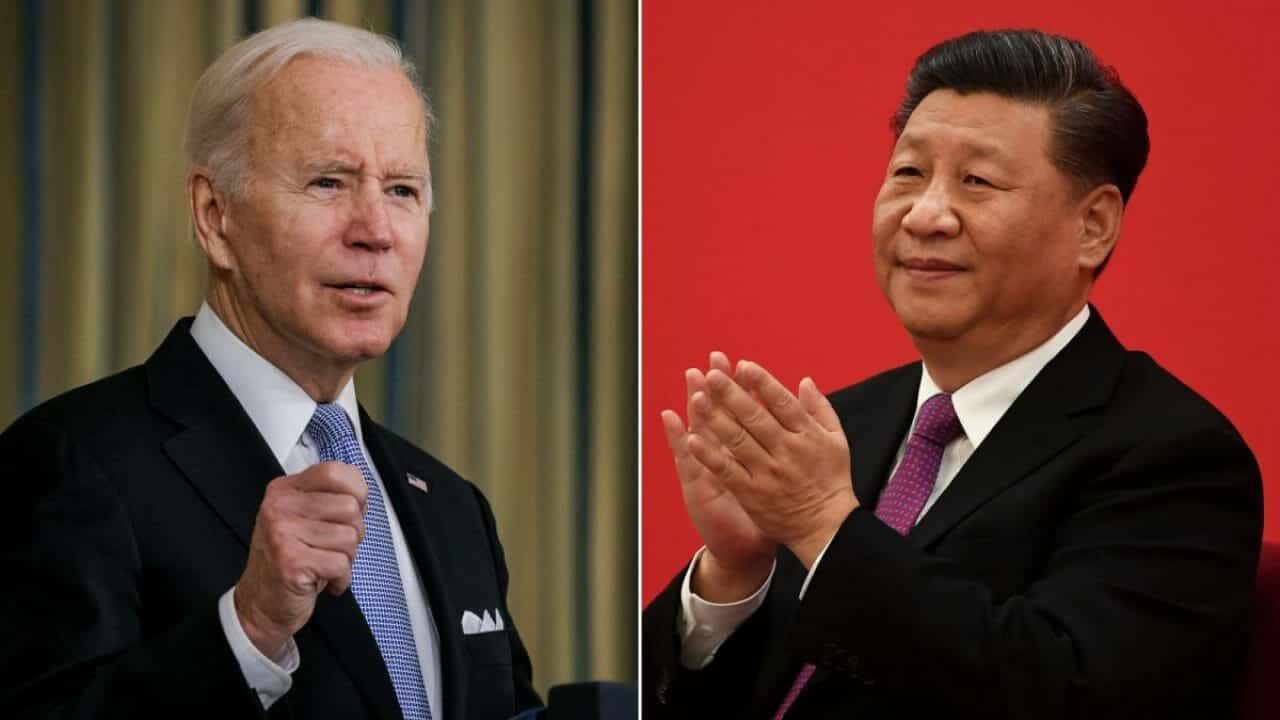US President Joe Biden and China’s Xi Jinping opened a virtual summit Monday with an appeal for better communication between the superpowers and what Biden called “guardrails” to avoid conflict.
Speaking from the White House to Xi on a television screen, Biden emphasized the need for settling a relationship rocked by high-stakes disputes, including on trade and Taiwan.
“It seems to me that our responsibility as leaders of China and the United States to ensure that the competition between our countries does not veer into conflict, whether intended or unintended. Just simple, straightforward competition,” Biden said.
He said they would have a “candid” discussion.
Xi, speaking from Beijing, called Biden “my old friend,” but said the rivals must work more closely.
“We face multiple challenges together. As the world’s two largest economies and permanent members of the UN Security Council, China and the United States need to increase communication and cooperation,” he said, speaking through an interpreter in brief public remarks, before they went behind closed doors.
The two leaders have spoken by phone twice since Biden’s inauguration in January but with Xi refusing to travel abroad because of the pandemic, an online video meeting was the only option short of an in-person summit.
White House spokeswoman Jen Psaki said Biden was going into the summit, expected to last a couple of hours, “from a position of strength,” after months of rebuilding alliances with other democracies to contain China.
The meeting is “an opportunity to set the terms of the competition with China” and to insist the leadership in Beijing “play by the rules of the road,” Psaki said.
Most of the attention in the build-up to the meeting has focused on the sparring over Taiwan, a self-ruling democracy claimed by China. Biden’s aides have cast the summit as an opportunity to help prevent tensions from escalating.
Both Biden and Xi emphasized the need for their countries to work together on major global issues, especially Covid-19 and climate change.
“A sound and steady China-US relationship” is needed “for safeguarding a peaceful and stable international environment,” Xi said.
However, the White House sought to temper expectations, with the official saying that the summit “is not a meeting where we expect deliverables to be coming out.”
Biden gets domestic boost
Relations between the superpowers plummeted during the presidency of Donald Trump, who launched a trade war with China while assailing Beijing’s response to an international probe into the origins of the Covid pandemic in the Chinese city of Wuhan.
Biden has recast the confrontation more broadly as a struggle between democracy and autocracy.
He got a boost Monday when he signed into law a $1.2 trillion infrastructure package, the biggest of its kind in more than half a century. Biden describes the initiative as an important step in catching up with years of intensive Chinese government investments, thereby proving that democracies can compete.
“The world is changing,” he said in a White House speech. “We have to be ready.”
While the day-to-day tone is more measured than in the Trump era, tension over Taiwan is threatening to escalate into dangerous new territory.
China has ramped up military activities near Taiwan in recent years, with a record number of warplanes intruding into the island’s air defense zone in October.
The United States says it supports Taiwan’s self-defense but is ambiguous about whether it would intervene to help directly.
In the brief comments made in front of reporters, Xi referred to each country needing to “run our domestic affairs” but did not mention US criticism of Beijing’s sabre-rattling around Taiwan, mass human rights violations or other sore points.
Last week, China’s Foreign Minister Wang Yi did not hold back, telling US Secretary of State Antony Blinken in a telephone call that “any connivance of and support for the ‘Taiwan independence’ forces undermines peace across the Taiwan Strait and would only boomerang in the end.”
China’s foreign ministry on Monday put the onus on Biden to improve relations.
“We hope that the US will work in the same direction as China to get along with each other,” foreign ministry spokesman Zhao Lijian told reporters.
A senior US administration official, who asked not to be identified, signaled Biden would be “very direct” on what he called “China’s coercive and provocative behavior with respect to Taiwan.”
Biden, a veteran of foreign policy issues during his decades in politics, has often said phone conversations are no substitute for face-to-face meetings.
Xi has not left China for nearly two years, and Biden sharply criticized his absence at the recent COP26 climate summit in Glasgow and G20 summit in Rome.

